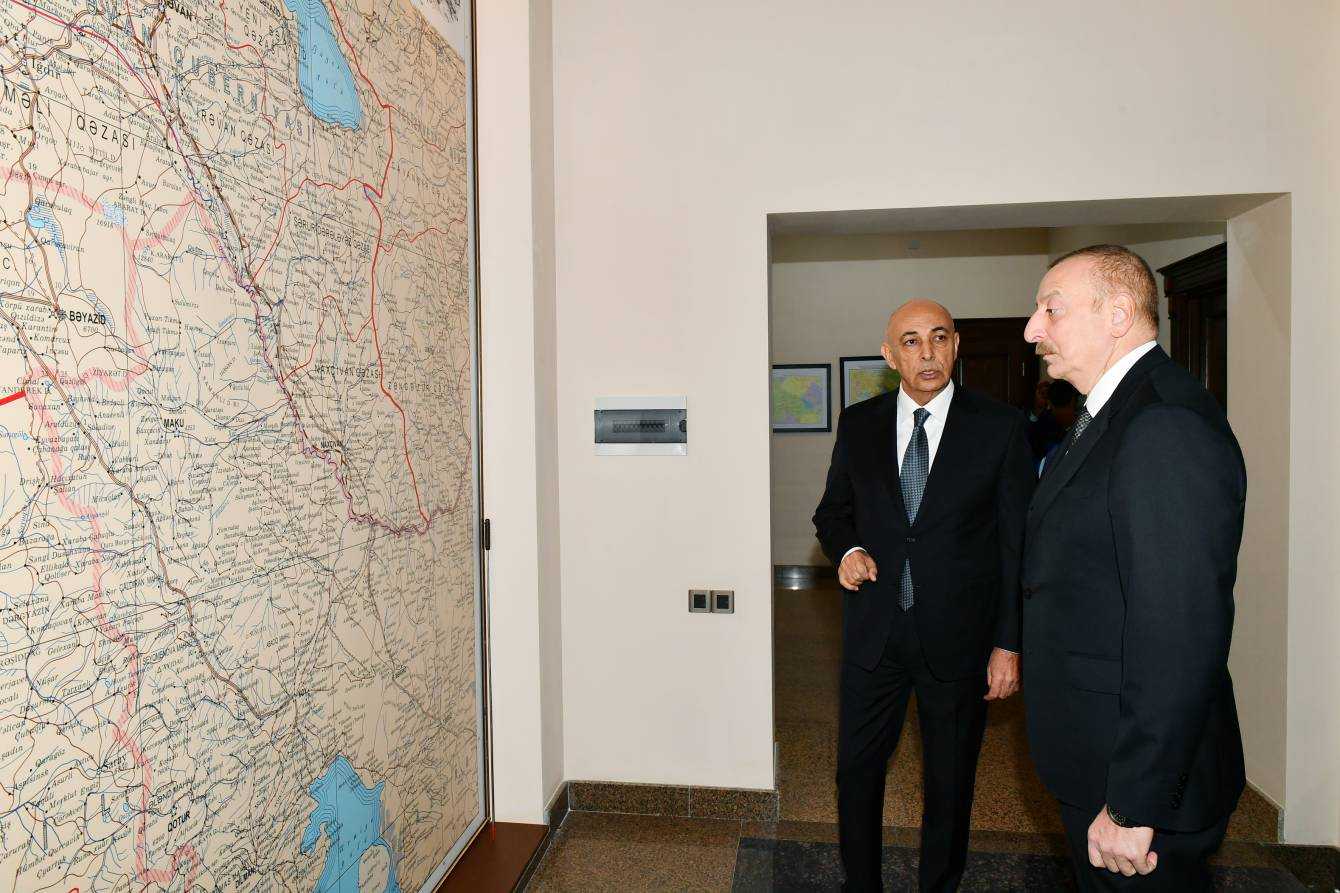
Armenia and Azerbaijan have published the draft of their peace agreement, months after having agreed to its terms. The two countries have yet to announce any plans to sign the peace deal.
The draft was published by each country’s respective Foreign Ministry on Monday afternoon.
The text of the draft agreement is published in full below:
The Republic of Armenia and the Republic of Azerbaijan (hereinafter, the Parties),
Realising the urgent necessity of the establishment of a just, comprehensive, and lasting peace in the region;
Desiring to contribute to that end through the establishment of inter-state relations;
Being guided by the Charter of the United Nations, the Declaration on Principles of International Law concerning Friendly Relations and Cooperation among States in accordance with the Charter of the United Nations (1970), the Final Act of the Helsinki Conference on Security and Co-operation in Europe (1975), and the Almaty Declaration of 21 December 1991, and aiming to develop relations on the basis of norms and principles enshrined therein;
Expressing their mutual will to establish good-neighbourliness between them;
Have agreed to establish peace and inter-state relations between them on the basis of the following:
ARTICLE I
Having confirmed that the boundaries between the Soviet Socialist Republics of the former USSR became the international borders of respective independent states and have been recognised as such by the international community, the Parties recognise and shall respect the sovereignty, territorial integrity, inviolability of international borders and political independence of each other;
ARTICLE II
In full compliance with Article I, the Parties confirm that they do not have any territorial claims to each other and shall not raise any such claims in the future.
The Parties shall not undertake any act, including planning, preparing, encouraging, and supporting such acts, which aim to dismember or impair, totally or in part, the territorial integrity or political unity of the other Party;
ARTICLE III
The Parties, in their mutual relations, shall refrain from the use of force or the threat of use of force against the territorial integrity or political independence or in any other manner inconsistent with the Charter of the United Nations. They shall not allow any third Party to use their respective territories for using force against the other Party inconsistent with the UN Charter;
ARTICLE IV
The Parties shall refrain from intervening with the internal affairs of each other;
ARTICLE V
Within ……. days after the exchange of instruments of ratification of this Agreement by both Parties, the Parties shall establish diplomatic relations between them in accordance with the provisions of the Vienna Conventions on Diplomatic and Consular Relations (1961 and 1963, respectively);
ARTICLE VI
In full compliance with their obligations under Article I of the present Agreement, the Parties shall conduct in good faith negotiations between the respective border commissions in accordance with the agreed upon regulations of the Commissions to conclude the Agreement on delimitation and demarcation of the state border between the Parties;
ARTICLE VII
The Parties shall not deploy along their mutual border forces of any third party. The Parties, pending the delimitation and subsequent demarcation of their mutual border, shall implement mutually agreed security and confidence-building measures, including in the military field, with a view to ensuring security and stability in the border regions;
ARTICLE VIII
The Parties condemn and shall combat intolerance, racial hatred and discrimination, separatism, violent extremism and terrorism in all their manifestations within their respective jurisdictions, and shall uphold their applicable international obligations;
ARTICLE IX
The Parties undertake to address the cases of missing persons and enforced disappearances taken place in the armed conflict which involved both of the Parties, including through the exchange of all available information about these persons, directly or in cooperation with relevant international organisations, as appropriate. The Parties, hereby, acknowledge the importance of investigating the fate of those persons, including searching for and returning the remains as appropriate and ensuring that justice is served in relation to these persons through proper investigations, as a means of reconciliation and building confidence. Corresponding modalities, in this regard, shall be negotiated and agreed upon in detail in a separate agreement;
ARTICLE X
In order to establish cooperation in various fields, including economic, transit and transport, environmental, humanitarian, and cultural, the Parties may conclude agreements in respective areas of mutual interest;
ARTICLE XI
The present Agreement does not infringe upon the rights and obligations of the Parties under international law and treaties concluded by each one of them with other UN Member-States. Each Party shall ensure that none of the international engagements now in force between it and any third party undermine its obligations taken under this Agreement;
ARTICLE XII
The Parties in their bilateral relations shall be guided by international law and this Agreement. None of the Parties may invoke the provisions of its internal legislation as justification for its failure to perform the present Agreement.
The Parties, in accordance with the Vienna Convention on the Law of Treaties (1969), shall refrain from acts that would defeat the object and purpose of this Agreement prior to its entry into force;
ARTICLE XIII
The Parties guarantee the full implementation of this Agreement and shall establish a bilateral commission to oversee implementation of the present Agreement. The Commission shall work on the basis of modalities to be agreed upon by the Parties;
ARTICLE XIV
Without prejudice to their rights and obligations under international law and other treaties which bind them in their mutual relations, the Parties shall strive for settling any dispute with respect to the interpretation or application of this Agreement through direct consultations, including within the Commission referred to in Article XIII. Should such consultations not yield result acceptable for both Parties within 6 months, the Parties shall seek other means of peaceful dispute settlement;
ARTICLE XV
Without prejudice to Article XIV, the Parties shall withdraw, dismiss, or otherwise settle any and all interstate claims, complaints, protests, objections, proceedings, and disputes related to the issues existed between the Parties before the signing of this Agreement in any legal forum within one month from the date of entry into force of this Agreement and shall not initiate such claims, complaints, protests, objections, proceedings, and shall not be involved in any manner into such claims, complaints, protests, objections, proceedings initiated against the other Party by any third-party.
The Parties shall not take, encourage or be involved in any manner in any hostile action against each other contrary to the present Agreement in diplomatic, information and other fields and shall conduct regular consultations to this end;
ARTICLE XVI
The Agreement shall enter into force after the exchange of instruments notifying about the completion of the internal procedures in line with the national legislations of the Parties. This Agreement shall be registered in conformity with Article 102 of the Charter of the United Nations;
ARTICLE XVII
The present Agreement is concluded in the Armenian, Azerbaijani, and English languages, with all three texts being equally authentic. In case of divergence as to the meaning of a provision under any of the authentic texts, the English text shall prevail.
Scant details, uncertain prospects
The full contents of the draft agreement have been up to speculation for months after Armenia and Azerbaijan agreed to its terms in March.
The draft peace agreement was published days after a meeting between Armenian Prime Minister Nikol Pashinyan, Azerbaijani President Ilham Aliyev, and US President Donald Trump in Washington DC on 8 August, where they initialed the peace deal and announced an agreement to establish a route connecting Azerbaijan to its exclave of Nakhchivan through Armenian territory.
Details remain scant on how the route, dubbed the Trump Route for International Peace and Prosperity (TRIPP), would be established or overseen.
The route had been a major sticking point in the peace talks between the two countries, in addition to the dissolution of the OSCE Minsk Group, changes to Armenia’s constitution, and the removal of ‘third party’ forces on their shared border — a reference to the European Union monitoring mission stationed on the Armenian side of the border since Azerbaijan’s September 2022 incursion into Armenia.
Changes to Armenia’s constitution and the dissolution of the OSCE Minsk Group were named as preconditions to a peace deal, while the removal of ‘third party’ forces made it into the draft agreement under Article VII.
Friday’s agreement did not include any mention of Armenia’s constitution, but Pashinyan has said that Armenia is open to changing the constitution, but that the process requires a national vote, which may not be until parliamentary elections in 2026. Previously, in 2024, the Armenian government said it would hold a constitutional referendum in 2027.
Article XIV also stipulates that the two countries would drop claims, complaints, protests, objections, proceedings, and disputes in any legal forum within a month of the agreement’s signing. This likely stems from Azerbaijani demands that Armenia withdraw all its claims against it in international courts.
While the draft states that the two countries recognise each other’s borders and territorial integrity, no details were made public — either through the draft agreement or in the Washington meeting — as to how Armenia and Azerbaijan intend to move forward with border demarcation.
It is yet unclear when Yerevan and Baku intend to sign the peace deal.












